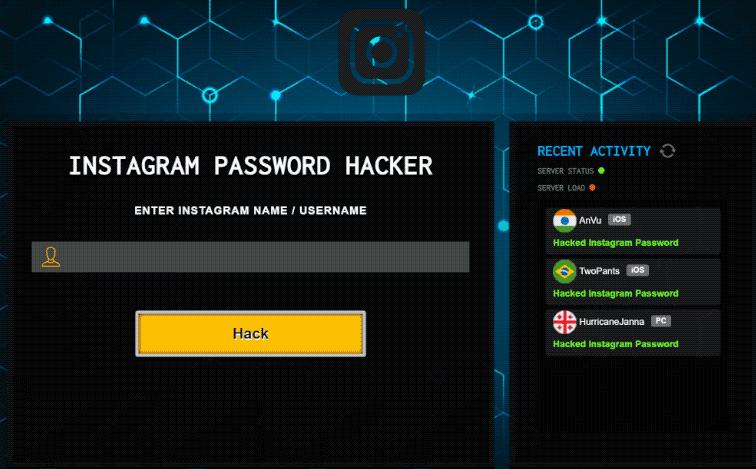Remove “Instagram Password Hacker” scam
The “Instagram Password Hacker” scam refers to fake services that claim to allow users to get Instagram account passwords by simply entering the username. instagramhackonline.com is one of the sites promoting these scams. The site requires users to enter an Instagram username to get the password. If users initiate this supposed hack, they will get an alert saying they need to verify they are human by sending an SMS. It goes without saying that this “Instagram Password Hacker” site does not work. Instead of getting Instagram account passwords, users will only hand over their phone numbers to scammers. Similar scams may try to trick users into downloading malware or ask for payments.
The “Instagram Password Hacker” scam promoted on instagramhackonline.com claims that just by typing in an Instagram account handle, you can get the password for the account. It supposedly takes only a few minutes. The site shows recent supposedly successful hacks on the right side, and if you scroll down, you’ll see fake comments from users who were supposedly successful in gaining unauthorized access to an Instagram account.
If you type in anything on the displayed box, whether it’s an account name or complete gibberish, you’ll see a loading screen and then get redirected to a site displaying a message saying you need to send an SMS to verify you are human and get the file with the password. If you follow the instructions and send the SMS, you will be sharing your phone numbers with malicious actors. There’s a possibility that you might receive a reply containing an attached file, which would be falsely presented as containing the password. While the primary aim of the scam seems to be acquiring phone numbers, scammers might also attempt to distribute malware by disguising it as password files sent to those who send the initial SMS.
Opening any attached files could lead to malware infections on your devices. It’s important to note that these files will not contain any actual passwords. You could be at risk of various threats, including keyloggers, trojans, crypto miners, and ransomware. A keylogger, for instance, can capture passwords and potentially banking details, while ransomware may lock the entire device until a ransom is paid. To steer clear of malware, it’s important that you avoid opening any attachments or clicking on links from unknown sources.
While the Internet is full of ads and posts advertising such services and promising easy unauthorized access to social media accounts, none of them work. Putting aside all moral issues, getting an Instagram account’s password would involve a phishing campaign that successfully gets the account holder to type in the password on a phishing site. Successful phishing campaigns take a while and cost money, so all of these “Instagram Password Hacker” services will always be scams. Every single one of them. Being able to access someone’s social media account is quite challenging and definitely isn’t just a matter of entering a username and clicking “Hack” on some website.
The “Instagram Password Hacker” scam is a very specific scam, so users likely end up on a site promoting it when searching for ways to gain unauthorized access to an Instagram account. Users who lose access to their own Instagram accounts may also try to use such services. Whatever the case may be, the “Instagram Password Hacker” is nothing more than a scam.
If you have used this scam service and have sent the SMS, you need to be very careful with unsolicited contact. Successfully phished information, like phone numbers, is often used to perform more sophisticated attacks.
How do users end up on sites like instagramhackonline.com
In this instance, users who land on the site promoting the “Instagram Password Hacker” scam are likely searching for it with the aim of accessing someone else’s Instagram account. Links to this site may appear in search results when users input queries like “Instagram password hack”, “How to hack Instagram password”, or similar phrases.
Additionally, users might be redirected to this site while navigating high-risk, ad-heavy websites or due to adware infections on their devices. Certain types of websites, particularly those hosting adult or pirated content, often trigger these redirects regardless of what users click. Typically, using any decent ad blocker can effectively prevent these unwanted pop-ups and redirects.
Site Disclaimer
WiperSoft.com is not sponsored, affiliated, linked to or owned by malware developers or distributors that are referred to in this article. The article does NOT endorse or promote malicious programs. The intention behind it is to present useful information that will help users to detect and eliminate malware from their computer by using WiperSoft and/or the manual removal guide.
The article should only be used for educational purposes. If you follow the instructions provided in the article, you agree to be bound by this disclaimer. We do not guarantee that the article will aid you in completely removing the malware from your PC. Malicious programs are constantly developing, which is why it is not always easy or possible to clean the computer by using only the manual removal guide.

